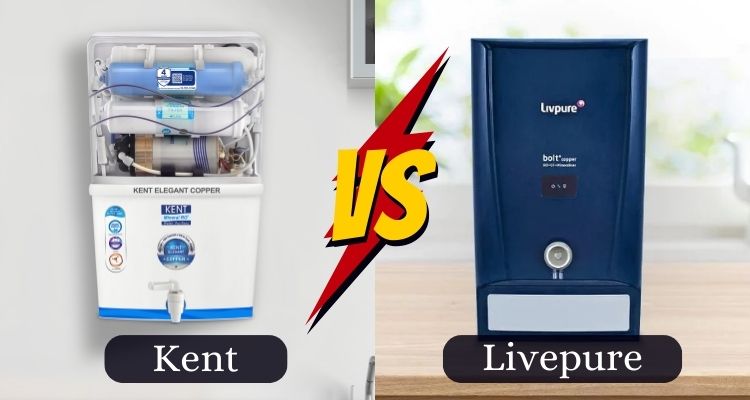When it comes to choosing the best water purifier for your home, two brands often top the list: best Kent vs Livpure. Both offer a variety of options designed to ensure that you get clean, safe, and healthy drinking water. But which one is better suited for your needs? To help you make an informed decision, let’s compare Kent and Livpure based on key factors like technology, features, pricing, and performance.
1. Technology & Filtration Process
Kent: Kent is a leader in water purification technology in India, known for its advanced Mineral RO Technology. Kent purifiers use a multi-stage filtration process that typically includes RO+UV+UF+TDS controller, which removes dissolved impurities, bacteria, viruses, and heavy metals, while also retaining essential minerals in the water.
- RO (Reverse Osmosis): Removes dissolved salts, heavy metals, and impurities.
- UV (Ultraviolet): Kills bacteria and viruses.
- UF (Ultrafiltration): Removes particles and improves water clarity.
- TDS Controller: Adjusts the TDS level to retain essential minerals.
Livpure: Livpure also uses advanced RO+UV+UF filtration technology, but with a focus on affordability without compromising quality. Some of Livpure’s models include Mineralizer technology, which helps in restoring essential minerals like calcium and magnesium after purification, giving the water a natural taste.
- RO+UV+UF: Comprehensive purification system.
- Mineralizer: Ensures the retention of essential minerals.
- Activated Carbon Filter: Enhances taste and odor.
Verdict: Both Kent and Livpure provide reliable multi-stage filtration, but Kent stands out with its Mineral RO Technology and TDS controller, offering more control over water quality. Livpure’s Mineralizer feature is a close contender, particularly for improving taste.
2. Performance in High TDS Areas
Kent: Kent is designed for regions with high TDS (Total Dissolved Solids) levels. Its purifiers can handle water with TDS levels as high as 2000 ppm. The TDS controller helps maintain the mineral content in the water, ensuring it tastes good without being too salty or bitter.
Livpure: Livpure’s purifiers are also effective in areas with high TDS but may not be as effective as Kent in extremely hard water areas. However, Livpure’s purifiers are suitable for households with TDS levels below 1500 ppm. For higher TDS, some Livpure models come with auto shut-off features to protect the system.
Verdict: Kent is the better option for areas with very high TDS levels, while Livpure works well for moderate to low TDS levels.
3. Storage Capacity and Design
Kent: Kent offers a range of purifiers with large storage capacities. Depending on the model, Kent purifiers can store up to 8-10 liters of purified water. The storage tank is generally made of food-grade plastic, ensuring safety and durability. Kent’s purifiers have a sleek, modern design that suits most kitchens.
Livpure: Livpure purifiers also come with varying storage capacities, typically ranging from 6 to 8 liters. The design is compact and stylish, making it a good choice for smaller kitchens. Livpure offers models with a digital display that shows the purifier’s status and filter life.
Verdict: Both brands offer good storage options, but Kent has slightly larger capacities. If space is a concern, Livpure may be more suitable due to its compact designs.
4. Price and Value for Money
Kent: Kent water purifiers are generally on the pricier side due to their advanced technology and high-quality performance. The brand is known for its durability and long-term reliability, but the upfront cost may be higher than some other brands. However, the filters need to be replaced less frequently due to the robust technology.
Livpure: Livpure offers more affordable options compared to Kent, making it a popular choice for budget-conscious consumers. Although the price is lower, Livpure still delivers good performance with advanced filtration systems. The maintenance costs are also relatively lower than Kent’s.
Verdict: If you’re looking for a more budget-friendly option, Livpure offers excellent value for money, while Kent is worth the investment if you’re looking for high-end features and long-term reliability.
5. Maintenance and After-Sales Service
Kent: Kent is known for its strong after-sales service network across India. The company provides annual maintenance contracts (AMC), and its customer support team is highly regarded for prompt service. Kent’s purifiers require periodic filter replacement, which can be done easily through their service centers.
Livpure: Livpure offers good after-sales support as well, with easy access to customer service across major cities. The company provides AMCs, and their filters are easy to replace. Livpure has a strong reputation for affordable servicing, which is a major plus for many customers.
Verdict: Both brands provide reliable after-sales service, but Kent has a larger service network, making it slightly more accessible in remote areas.
Conclusion: Which One Is Right for You?
Choose Kent if you:
- Live in an area with very high TDS levels.
- Prefer advanced features like the TDS controller and Mineral RO Technology.
- Are looking for a long-term investment with durable performance.
Choose Livpure if you:
- Are on a budget and want a reliable yet affordable water purifier.
- Need a purifier for moderate to low TDS levels.
- Prefer compact designs with modern features like Mineralizer and digital displays.
Both Kent and Livpure are excellent choices for purifying water at home. Your decision should be based on the specific water quality in your area, your budget, and your preference for additional features.
Name: Aquafresh RO
Address:- Office No. – 105, Sec. 80 Noida, Near Old Court, Utter Pradesh 201301
Head Office No. +91 8178875502
Visit: Real-Time Comfort: Exploring IoT Based HVAC Monitoring System






